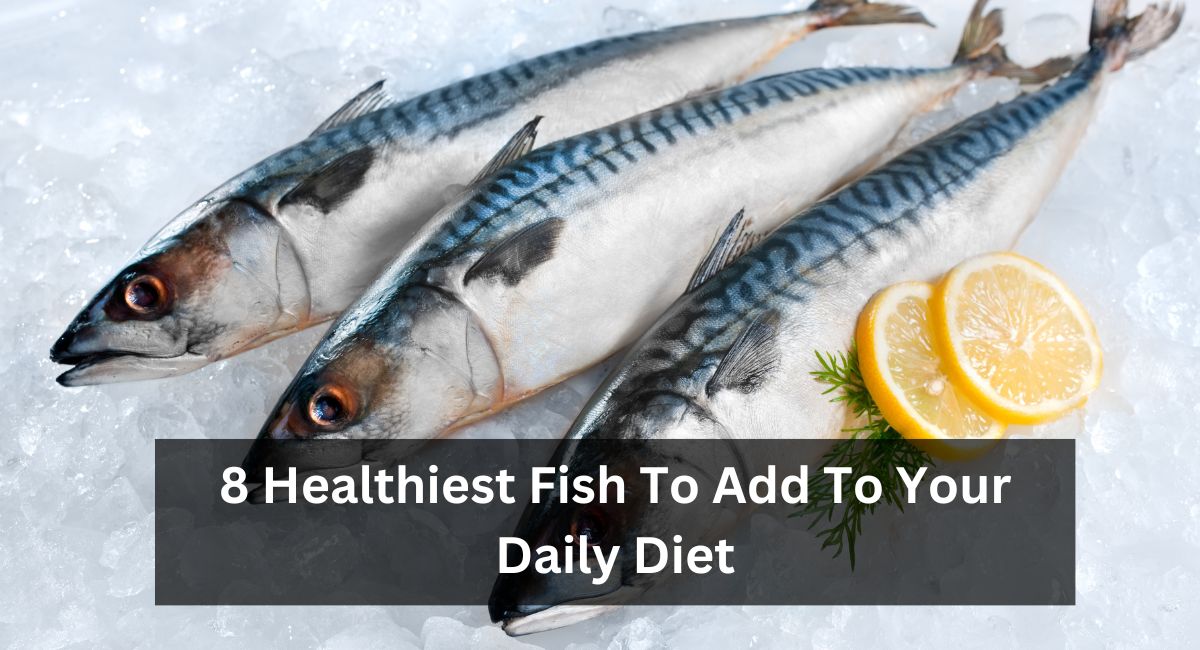Fish, often hailed as a nutritional powerhouse, is packed with essential nutrients like omega-3 fatty acids and high-quality proteins. Including fish in your daily diet can contribute to improved heart health, brain function, and overall well-being.
Let’s explore the ocean of options and dive into the top eight healthiest fish that you should consider incorporating into your daily meals.
1. Salmon: The Omega-3 Powerhouse
Overview: Salmon is renowned for its rich omega-3 fatty acid content, particularly EPA and DHA. These fatty acids support heart health, reduce inflammation, and contribute to cognitive function.
Nutritional Highlights: Salmon is a great source of high-quality protein, vitamin D, and B vitamins. Opt for wild-caught salmon for a leaner and more nutrient-dense option.
2. Mackerel: The Nutrient-Rich Fish
Overview: Mackerel is a fatty fish that boasts an impressive nutrient profile. It is rich in omega-3s, selenium, and vitamin B12.
Nutritional Highlights: Mackerel’s omega-3 content promotes heart health, while selenium acts as a powerful antioxidant. Its abundance of vitamin B12 supports nerve function and the production of red blood cells.
3. Sardines: Small Fish, Big Benefits
Overview: Despite their small size, sardines pack a nutritional punch. They are an excellent source of omega-3s, calcium, and vitamin D.
Nutritional Highlights: Sardines are a sustainable and budget-friendly choice. The high calcium content promotes bone health, while omega-3s contribute to cardiovascular well-being.
4. Cod: Lean Protein for Muscle Health
Overview: Cod is a lean, white fish that’s versatile and easy to incorporate into various dishes. It provides a healthy dose of protein without excessive fat.
Nutritional Highlights: Cod is an excellent source of high-quality protein, phosphorus, and vitamin B12. It supports muscle health, aids in red blood cell formation, and promotes bone health.
5. Trout: A Heart-Healthy Catch
Overview: Trout, whether rainbow or brown, is a delicious and nutritious fish. It’s known for its omega-3 content and is a good alternative to higher-mercury fish.
Nutritional Highlights: Trout’s omega-3 fatty acids contribute to heart health, and it’s also a good source of protein, potassium, and vitamin D. Its versatility in cooking makes it an easy addition to your daily meals.
6. Tuna: Versatile and Protein-Packed
Overview: Tuna is a widely consumed fish that offers versatility and convenience. Whether canned or fresh, tuna is an excellent source of lean protein.
Nutritional Highlights: Tuna is rich in protein, selenium, and vitamin D. However, be mindful of mercury levels, especially in larger species like albacore. Opt for skipjack or chunk light tuna for lower mercury content.
7. Herring: The Heart-Friendly Fish
Overview: Herring is a fatty fish that boasts a distinctive flavor. It’s an excellent source of omega-3 fatty acids, making it a heart-healthy choice.
Nutritional Highlights: Herring’s omega-3 content supports cardiovascular health and may help reduce inflammation. It also provides vitamin D and vitamin B12, contributing to overall well-being.
8. Anchovies: Tiny Fish, Big Nutrition
Overview: Anchovies, despite their small size, offer significant nutritional benefits. They are rich in omega-3s, calcium, and iron.
Nutritional Highlights: Anchovies are a low-calorie, high-protein option. Their omega-3 fatty acids support heart health, while calcium and iron are crucial for bone health and oxygen transport in the blood.
Incorporating Healthy Fish into Your Diet: Tips and Tricks
Now that we’ve explored the healthiest fish options, here are some tips to seamlessly include them in your daily diet:
1. Variety is Key:
- Rotate between different fish species to ensure a diverse range of nutrients.
- Experiment with various cooking methods, such as grilling, baking, or steaming.
2. Mindful Preparation:
- Opt for healthier cooking methods to preserve the nutritional value of fish.
- Use herbs, spices, and citrus to enhance flavor without relying on excessive salt or high-fat sauces.
3. Budget-Friendly Options:
- Choose frozen fish, which is often more affordable than fresh, without compromising on nutritional value.
- Explore local and seasonal fish varieties for cost-effective and sustainable choices.
4. Be Mindful of Mercury:
- While fish is generally a healthy choice, it’s essential to be aware of mercury levels, especially for pregnant individuals.
- Refer to guidelines from health organizations to make informed choices about mercury content in different fish species.
5. Sustainable Sourcing:
- Consider purchasing fish from sustainable sources to support environmental conservation efforts.
- Look for certifications from reputable organizations that ensure responsible fishing practices.
Conclusion: A Sea of Wellness at Your Table
Incorporating the healthiest fish into your daily diet is a flavorful journey toward improved well-being. From the omega-3 richness of salmon to the lean protein in cod, each fish brings a unique set of nutrients to the table. As you navigate the sea of options, remember to prioritize variety, mindful preparation, and sustainability. With these healthy fish choices, you can reel in the benefits of enhanced heart health, brain function, and overall vitality – making every meal a celebration of wellness from the depths of the ocean.
-
The Top 10 Superfoods for Brain Health, Weight Loss, and More

Incorporating superfoods into your diet can significantly enhance your overall health, providing essential nutrients that promote brain function, aid in weight loss, and contribute to various other health benefits. Here’s … Read more
-
Coke Zero vs. Diet Coke

For decades, Coca-Cola has offered two sugar-free cola options: Diet Coke and Coke Zero. Both beverages boast zero calories and zero sugar, leaving many consumers wondering – what’s the real … Read more
-
A New Study Says Gray Hair May Be Reversible

Hair color comes from melanin, a pigment produced by melanocyte stem cells located at the base of hair follicles. These melanocyte stem cells go through different stages, and at each … Read more
